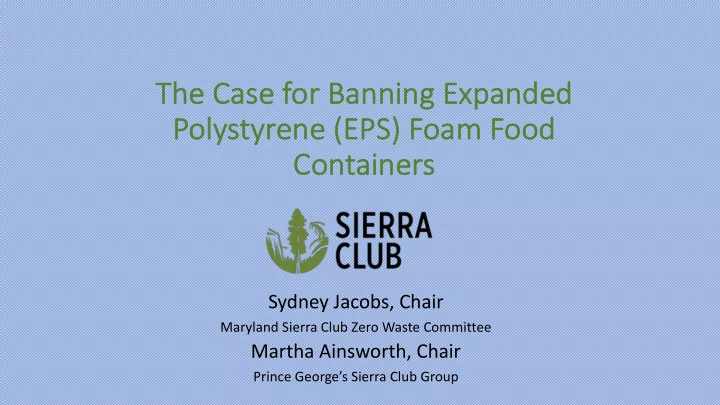

The The Ca Case fo for Ba Banning Expanded Po Polystyrene (E (EPS) ) Fo Foam Fo Food Con Containers Sydney Jacobs, Chair Maryland Sierra Club Zero Waste Committee Martha Ainsworth, Chair Prince George’s Sierra Club Group
Overview The Big Picture: EPS Foam bans in a larger context Environmental impact of EPS Foam Issues around recycling EPS foam The success of current EPS foam bans in Maryland
The Plastic Revolution - Gone Rogue
EPS Foam is a major component of beach and ocean litter…. • 80% of ocean plastic pollution originates on land. • Foam containers are easily blown over long distances Where they breaks down into increasingly smaller pieces. • EPS foam litter is very difficult to recover: Tiny pieces mix into Beach sands and float with Plankton on the ocean surface.
Plastic litter, including EPS Foam, is especially harmful to wildlife…. ●Marine litter harms over 700 marine animal species ● Seabirds are particularly vulnerable – in some populations nearly 100% have ingested plastic
EPS Foam Food Containers are not Recyclable • Used food service foam is not recyclable unless it’s very clean • Breaks into pieces in single stream collection, contaminating other materials • It’s Expensive to transport • There’s no market for the collected material
EPS takes up valuable space in landfills EPS is lightweight but high in volume
Two drop-off centers in Carroll County take primarily block foam packaging Dart distribution center, Hampstead Northern Landfill, Westminster Collection and processing is done by Dart, not the county. .
Bans on EPS food containers are already working in Maryland! • Montgomery and Prince George’s County bans became effective in 2016 • Prohibits use of foam by all businesses that sell food • Prohibits the sale of foam containers • Foam meat/fish trays and products packaged outside counties are exempt • Complaint-driven and public health inspector enforcement; in Prince George’s, first time warning, second time $250, third $1000/day.
Affordable alternatives are widely available and in use Exclusively foam containers 3% No foam 25% Mix of foam and other types 72% Prince George's County, March 2015 (random sample of 186 restaurants county-wide)
Major chains have switched to alternatives where bans exist, and some are completely eliminating EPS foam from all locations everywhere EPS Recyclable These Plastic alternatives EPS are already in use in other Maryland counties… Why not Recyclable in Plastic Carroll County? EPS Paper
Compliance rates are excellent! Prince George’s County Compliance rose to over 90% after face-to-face education of businesses by Sierra Club volunteers. 100 93 91 91 91 78 80 76 Compliance rate 65 Percent in compliance (Spring 2017) 60 Compliance rate 50 (Fall 2017) 40 Source : PGSC Monitoring of 20 465 businesses in 45 shopping centers, 2017 0 All Eateries Retailers Pharmacies businesses (n=324) (n=77) (n=14) (n=441) Type of business
Compliance rates are high! Montgomery County Compliance by Montgomery businesses and those in Gaithersburg (separate ban) is about 90% at first visit, though pharmacies are less aware. 100 94 90 88 87 86 81 79 80 Percent compliant 60 40 33 Source : Montgomery Sierra Club 20 monitoring of 328 businesses in 38 shopping centers, Jan-Feb 2018 0 All Gaithersburg Fast food Carry outs Restaurants Grocery Retail (n=28) Pharmacies businesses businesses (n=79) (n=60) (n=104) stores (n=21) (n=12) (n=328) (n=82) TYPE OF BUSINESS * As of February 14, 2018
Lessons & Recommendations (a) Retail sales, and institutions such as hospitals and schools, should be included with all food service businesses (b) ban packing peanuts (c) A well-planned and executed education campaign is essential before and after adoption (d) Penalties should be substantial enough to discourage non-compliance (e) Consistency with bans in nearby jurisdictions is pro-business (f) EPS food service ban should be integrated into an overall Zero Waste plan, with expanded recycling and composting of other container types
Recommend
More recommend